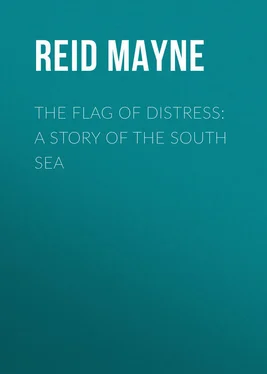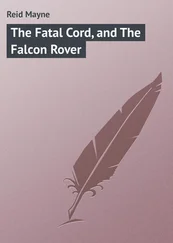Mayne Reid - The Flag of Distress - A Story of the South Sea
Здесь есть возможность читать онлайн «Mayne Reid - The Flag of Distress - A Story of the South Sea» — ознакомительный отрывок электронной книги совершенно бесплатно, а после прочтения отрывка купить полную версию. В некоторых случаях можно слушать аудио, скачать через торрент в формате fb2 и присутствует краткое содержание. Жанр: literature_19, foreign_antique, foreign_prose, foreign_children, на английском языке. Описание произведения, (предисловие) а так же отзывы посетителей доступны на портале библиотеки ЛибКат.
- Название:The Flag of Distress: A Story of the South Sea
- Автор:
- Жанр:
- Год:неизвестен
- ISBN:нет данных
- Рейтинг книги:3 / 5. Голосов: 1
-
Избранное:Добавить в избранное
- Отзывы:
-
Ваша оценка:
- 60
- 1
- 2
- 3
- 4
- 5
The Flag of Distress: A Story of the South Sea: краткое содержание, описание и аннотация
Предлагаем к чтению аннотацию, описание, краткое содержание или предисловие (зависит от того, что написал сам автор книги «The Flag of Distress: A Story of the South Sea»). Если вы не нашли необходимую информацию о книге — напишите в комментариях, мы постараемся отыскать её.
The Flag of Distress: A Story of the South Sea — читать онлайн ознакомительный отрывок
Ниже представлен текст книги, разбитый по страницам. Система сохранения места последней прочитанной страницы, позволяет с удобством читать онлайн бесплатно книгу «The Flag of Distress: A Story of the South Sea», без необходимости каждый раз заново искать на чём Вы остановились. Поставьте закладку, и сможете в любой момент перейти на страницу, на которой закончили чтение.
Интервал:
Закладка:
Calderon, as said, is a gentleman by birth, and a ganadero , or stock-farmer, by occupation. He inherits a considerable tract of pasture-land, left him by his father – some time deceased – along with the horses and horned cattle that browse upon it. An only son, he is now owner of all. But his ownership is not likely to continue. He is fast relinquishing it, by the pursuit of evil courses – among them three of a special kind: wine, women, and play – which promise to make him bankrupt in purse, as they already have in character. For around San Francisco, as in it, he is known as roué and reveller, a debauchee in every speciality of debauch, and a silly fellow to boot. Naturally of weak intellect, and dissipation has made it weaker.
Of as much moral darkness, though different in kind, is the character of Don Francisco de Lara – “Frank Lara,” as he is familiarly known in the streets and saloons. Though Spanish in features, and speaking the language, he can also talk English with perfect fluency – French too, when called upon, with a little Portuguese and Italian. For, in truth, he is not a Spaniard, but only so by descent, being a Creole of New Orleans – that cosmopolitan city par excellence – hence his philological acquirements.
Frank Lara is one of those children of chance, wanderers who come into the world nobody knows how, when, or whence; only, that they are in it; and while there, performing a part in accordance with their mysterious origin – living in luxury, and finding the means for it, by ways that baffle conjecture.
He is full thirty years of age; the last ten of which he has spent on the shores of San Francisco Bay. Landing there from an American whaling-vessel, and in sailor costume, he cast off his tarry “togs,” and took to land-life in California. Its easy idleness, as its lawlessness, exactly suited his natural inclinations.
Similar inclinings and pursuits, at an early period brought him and Calderon in contact; and certain relations have been established between them; in other words, they have become united in a business partnership – a bank ; of that species known as “ monté ” bank.
Since the discovery of the gold placers , the streets of San Francisco have been crowded with men mad after the precious metal; among them some who do not desire to undergo the toil of sifting it out of sand, or washing it from river-mud. They prefer the easier, and cleaner, method of gathering it across the green baize of a gambling table.
To accommodate such gentry, Francisco de Lara has established a monté bank, Faustino Calderon being his backer. But though the latter is the moneyed man, and has supplied most of the cash to start with, he does not show in the transaction. He is only as the sleeping partner; De Lara, with less reputation at stake, being the active and ostensible one.
As yet Faustino Calderon has not come within the category of the professional gamester, and respectability does not repel him. His dissipated habits are far from exceptional, and his father’s good name still continues to throw its aegis over him. Under it he is eligible to Californian society of the most select kind, and has the entrée of its best circles.
And so also Don Francisco de Lara – in a different way. Wealth has secured him this; for although anything but rich, he has the repute of being so, and bears evidence of it about him. He is always stylishly and fashionably attired; his shirt of the finest linen, with diamond studs sparkling in its front. Free in dispensing gratuities, he gives to the poor and the priests – finding this last kind of largess a good speculation. For, in California, as in other Catholic countries, the dispenser of “Peter’s Pence” is sure of being held in high estimation. Frank Lara so dispenses with a liberal hand; and is therefore styled “Don” Francisco – saluted as such by the sandalled monks and shovel-hatted priests who come in contact with him.
In addition to all, he is good-looking and of graceful deportment, without being at all a dandy. On the contrary he carries himself with earnest air, calm and cool, while in his eyes may be read the expression — noli me tangere . A native of New Orleans, where duels occur almost daily, he is up in the art d’escrime ; and since his arrival in California has twice called out his man – on the second occasion killing him.
Escroc as the French might call him; “blackleg” in the English vocabulary; “sport” in American phrase, Frank Lara is a man with whom no one who knows him likes to take liberties.
Such are the two men whom Iñez Alvarez has facetiously styled types of Californian “chivalry,” while Carmen Montijo has more correctly described them as typical of its “villainy.” And yet to make call on this very Iñez, and this same Carmen, the gentlemen so differently designated are now on their way!
Chapter Thirteen.
Confession of Fear
After having delivered their speeches, so nearly alike in sound, yet so opposed in sense, the two girls stand for a short time silent, their faces turned toward the approaching horsemen. These are still more than a mile off, and to the ordinary eye only distinguishable as mounted men wearing cloaks – one of scarlet colour, the other sky-blue. But despite the distance, the others easily identify them, simultaneously, and in tone contemptuous, pronouncing their names.
“Yes,” says Carmen, now speaking in full assurance, with a lorgnette raised to her eyes – hitherto bent upon the British warship, “in all California there are no truer types of what I’ve called them. Do you think they’re coming on to the house, Iñez?”
“’Tis very likely; I should say, almost certain.”
“What can be bringing them?” mechanically queries Carmen, with an air of increased vexation.
“Their horses, aunt,” rejoins the niece, jestingly.
“Don’t jest, niña ! It’s too serious.”
“What’s too serious?”
“Why, these fellows coming hither. I wonder what they can be wanting?”
“You needn’t wonder at that,” says Iñez, still speaking jocularly. “I can tell you what one of them wants, that one Don Francisco de Lara. He is desirous to have a look at the mistress of this mansion.”
“And Don Faustino Calderon is no doubt equally desirous to look at her niece,” retorts the other in like bantering tone.
“He’s quite welcome. He may look till he strains his ugly eyes out. It won’t make any impression on me.”
“I’m sorry I can’t say the same for Don Francisco. On me, his looks do make impression – far from pleasant.”
“It wasn’t always so, tia ?”
“No, I admit. I only wish it had been.”
“But why?”
“Because, now I shouldn’t need to be afraid of him.”
“Afraid of him! Surely you are not that?”
“Well, no – not exactly afraid – still – ”
She speaks hesitatingly, and in disjointed phrases, her head drooping down. Then a quick change comes over her countenance, and, bending closer to the other, she asks, “Can I trust you with a confidence, Iñez?”
“Why need you ask that? You’ve already trusted me with one – in telling me you love Don Eduardo.”
“Now I give you another – by telling you I once loved Don Francisco.”
“Indeed!”
“No, no!” rejoins Carmen quickly, and as half-repenting the avowal. “Not loved him – that’s not true, I only came near it .”
“And now?”
“I hate him!”
“Why, may I ask? What has changed you?”
“That’s easily answered. When I first met him I was younger than now; a mere girl, full of girlish fancies – romantic, as called. I thought him handsome; and in a sense so he is. In person, you’ll admit, he’s all man may, or need, be – a sort of Apollo, or Hyperion. But in mind – ah, Iñez, that man is a very Satyr – in heart and soul a Mephistopheles.”
Читать дальшеИнтервал:
Закладка:
Похожие книги на «The Flag of Distress: A Story of the South Sea»
Представляем Вашему вниманию похожие книги на «The Flag of Distress: A Story of the South Sea» списком для выбора. Мы отобрали схожую по названию и смыслу литературу в надежде предоставить читателям больше вариантов отыскать новые, интересные, ещё непрочитанные произведения.
Обсуждение, отзывы о книге «The Flag of Distress: A Story of the South Sea» и просто собственные мнения читателей. Оставьте ваши комментарии, напишите, что Вы думаете о произведении, его смысле или главных героях. Укажите что конкретно понравилось, а что нет, и почему Вы так считаете.












